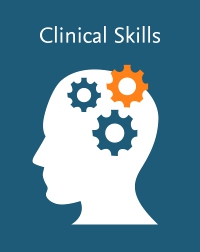
Clinical Skills: Maternal Newborn Collection (Access Card), 1st Edition
Clinical Skills Online - Access Card

Learn to master the most important nursing skills before you ever step foot in the clinical environment. Clinical Skills: Maternal Newborn Collection is an engaging, web-based learning tool that guides users through more than 100 of the most important maternal newborn nursing skills. Next Generation (Next Gen) Skills are the same trusted content, but now with an updated interface and additional course functionality. Each skill in the collection uses the same seven-part framework to walk you through every aspect of the skill. From special patient and safety considerations to the equipment and techniques used in the skill, this assembly of animations, interactive learning tools, and in-depth explanations will leave you with a 360-degree understanding of how to safely and effectively perform each skill.
-
- Convenient web-based program utilizes the same professional format that practicing nurses use to train.
- Consistent, competency-based format for learning skills offers a standardized way for you to learn and perform skills. Most skills feature the same types of skill learning tools to help you obtain a more holistic understanding of the skill and standard QSEN nursing competencies.
- Quick sheet provides a concise, step-by-step summary of the skill.
- Extended text offers an in-depth look at all aspects of the skill. Subjects addressed in the extended text section include:
- Safety alerts
- Supplies
- Patient and family education
- Procedures
- Delegation opportunities
- Monitoring and care
- Expected and unexpected outcomes
- Documentation guidelines
- Special gerontologic, pediatric, and home care considerations
- Evidence-based references
- Additional reading suggestions
- Equipment list helps familiarize you with each piece of equipment needed to perform the skill.
- Demonstration videos and animations visually guide you through every necessary step involved in the skill.
- Images and illustrations highlight crucial procedures, equipment, and documents involved in the skill.
- Competency tests with rationales help you review and evaluate your understanding of the skill.
- Printable evaluation checklists help you measure and track various skill competencies.
- Continually updated, evidence-based content is reviewed and revised annually by clinical skills experts to reflect changes in practice as they arise.
-
Examples of skills in this collection include:
- Abdominal Wall Defect: Initial Care (Maternal-Newborn)
- Abnormal Presentation Delivery (Maternal-Newborn)
- Admission Assessment: Obstetric Patients (Maternal-Newborn)
- Amniocentesis: Assisting (Maternal-Newborn)
- Amnioinfusion (Maternal-Newborn)
- Apgar Score (Maternal-Newborn)
- Artificial Rupture of Membranes: Assisting (Maternal-Newborn)
- Assessment: Head to Toe: Newly Born (Maternal-Newborn)
- Assessment: Newborn Gestational Age (Maternal-Newborn)
- Assessment: Newborn Jaundice (Maternal-Newborn)
- Assessment: Obstetric Hypertensive Crisis (Maternal-Newborn)
- Assessment: Obstetric Triage (Maternal-Newborn)
- Assessment: Postpartum Patients (Maternal-Newborn)
- Assessment: Rupture of Amniotic Membranes (Maternal-Newborn)
- Bilirubin Meter: Irradiance Measuring (Maternal-Newborn)
- Bilirubin Meter: Transcutaneous Monitoring (Maternal-Newborn)
- Birthing Bed: Labor Positioning (Maternal-Newborn)
- Blood Specimen Collection: Umbilical Cord Gas (Maternal-Newborn)
- Bulb Syringe (Maternal-Newborn)
- Cardiopulmonary Resuscitation (CPR): Obstetric Patients (Maternal-Newborn)
- Care of the Obstetric Patient Receiving Magnesium Sulfate Therapy (Maternal-Newborn)
- Care of the Obstetric Patient Receiving Misoprostol (Maternal-Newborn)
- Care of the Obstetric Patient Receiving Nitrous Oxide Therapy (Maternal-Newborn)
- Care of the Obstetric Patient with Anesthesia-Related Hypotension (Maternal-Newborn)
- Care of the Obstetric Patient with Diabetes (Maternal-Newborn)
- Care of the Obstetric Patient: Antenatal Steroids (Maternal-Newborn)
- Care of the Patient Receiving Oxytocin (Maternal-Newborn)
- Care of the Patient: Cervical Ripening: Dinoprostone Vaginal Insert (Maternal-Newborn)
- Care of the Rh Negative Obstetric Patient (Maternal -Newborn)
- Cervical Cerclage (Maternal-Newborn)
- Cervical Ripening and Labor Induction: Mechanical Methods: Assisting (Maternal-Newborn)
- Cesarean Delivery: Circulating (Maternal-Newborn)
- Cesarean Delivery: Emergency (Maternal-Newborn)
- Chorionic Villus Sampling (CVS): Assisting (Maternal-Newborn)
- Circumcision Care (Maternal-Newborn)
- Compassionate Care for Grieving Families: Perinatal Loss (Maternal-Newborn)
- Contraction Stress Test (Maternal-Newborn)
- Cord Care (Maternal-Newborn)
- Deep Tendon Reflexes (Maternal-Newborn)
- Defibrillation of Obstetric Patients (Maternal-Newborn)
- Delivery Room Setup (Maternal-Newborn)
- Delivery Room Setup for Multiples (Maternal-Newborn)
- Dilation and Curettage (Maternal-Newborn)
- Eclamptic Seizure Management (Maternal-Newborn)
- Epidural Blood Patch: Assisting (Maternal-Newborn)
- Epidural Catheter Insertion: Assisting (Maternal-Newborn)
- Epidural Catheter Removal (Maternal-Newborn)
- External Cephalic Version (Maternal-Newborn)
- External Fetal Monitor Application (Maternal-Newborn)
- Eye Infection Prevention (Maternal-Newborn)
- Fall and Drop Prevention for the Newborn (Maternal-Newborn)
- Fetal Heart Rate: Assessment via Intermittent Auscultation and Electronic Monitor (Maternal-Newborn)
- Fetal Heart Rate: Interpretation (Maternal-Newborn)
- Fetal Spiral Electrode Application (Maternal-Newborn)
- Forceps Delivery (Maternal-Newborn)
- Fundal Massage (Maternal-Newborn)
- Hepatitis B Immunoprophylaxis (Maternal-Newborn)
- Hypertensive Disorders of Pregnancy (Maternal-Newborn)
- Initial Assessment: Newborn (Maternal-Newborn)
- Intrauterine Pressure Catheter Placement (Maternal-Newborn)
- Laboring Patients: Nursing Care (Maternal-Newborn)
- Leopold Maneuvers (Maternal-Newborn)
- Medication Administration: Intramuscular Injection (Maternal-Newborn)
- Medication Management of Obstetric Hypertensive Crisis (Maternal Newborn)
- Newborn Bath (Maternal-Newborn)
- Newborn Screening (Maternal-Newborn)
- Newborn Screening: Critical Congenital Heart Defects (Maternal-Newborn)
- Newborn Security (Maternal-Newborn)
- Nonstress Test (Maternal-Newborn)
- Obstetric Ultrasound: Assisting (Maternal-Newborn)
- Overhead Phototherapy (Maternal-Newborn)
- Phototherapy Blanket (Maternal-Newborn)
- Postoperative Care: Cesarean Delivery Recovery Period (Maternal-Newborn)
- Postpartum Hemorrhage (Maternal-Newborn)
- Precipitous Delivery: Breech (Maternal-Newborn)
- Precipitous Delivery: Vertex (Maternal-Newborn)
- Preoperative Care: Cesarean Delivery (Maternal-Newborn)
- Prolapsed Cord (Maternal-Newborn)
- Shoulder Dystocia (Maternal-Newborn)
- Skin-to-Skin Contact after Cesarean Delivery (Maternal-Newborn)
- Spina Bifida: Initial Care (Maternal-Newborn)
- Sterile Speculum Examination (Maternal-Newborn)
- Sterile Vaginal Examination (Maternal-Newborn)
- Teaching About Breastfeeding (Maternal-Newborn)
- Teaching About Formula Feeding (Maternal-Newborn)
- Teaching How to Safely Use a Car Seat (Maternal-Newborn)
- Teaching How to Care for a Newborn (Maternal-Newborn)
- Uterine Contractions: External Monitoring (Maternal-Newborn)
- Uterine Contractions: Manual Palpation (Maternal-Newborn)
- Vacuum-Assisted Birth: Assisting (Maternal-Newborn)
- Vaginal Birth After Cesarean Delivery (Maternal-Newborn)
- Vaginal Delivery (Maternal-Newborn)
- Vaginal Specimen Collection: Fetal Fibronectin (Maternal-Newborn)

 as described in our
as described in our 